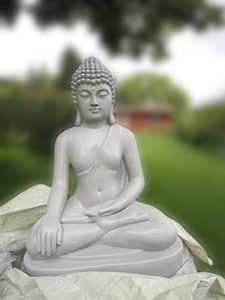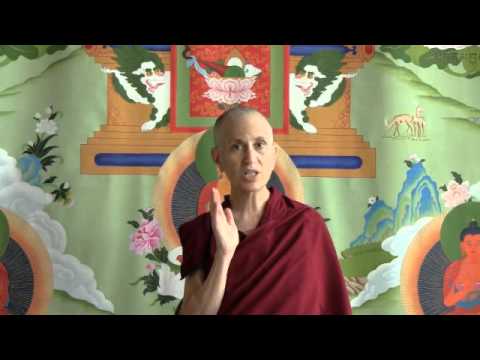Motivation and karma
This talk was given during the White Tara Winter Retreat at Sravasti Abbey.
- The importance of understanding karma
- What is a good motivation
- Keeping a clear motivation in the break times as well as in the meditation session
White Tara Retreat 08: Motivation and karma (download)
When we do the White Tara practice, we have to have some understanding of karma. This is because we are working very much with karma in the practice. First of all, we want to purify negative karma, especially negative karma that could shorten our life or interfere in our Dharma practice in other ways. In other words, karma that causes suffering in this and future life: karmic seeds that obscure the mind so that we can’t attain liberation and enlightenment. We also want to create merit, which is good karma that nourishes the mind. At the very beginning, we take refuge and generate bodhicitta. Those two are extremely important for this process of purification and for accumulation of merit to take place when we are doing the White Tara practice.
Especially regarding the motivation, a good motivation is one that is free of clinging attachment; free of anger, resentment, revenge; and free of the ignorance that doesn’t understand how karma and its effects work. This is why we cultivate the bodhicitta at the beginning, because there we aspire for enlightenment for the benefit of all sentient beings. That motivation is a very radical departure from our usual motivations. Our usual motivations basically create a lot of negative karma.
Karma just means action. It leaves imprints, or seeds on our mind, or energy traces—however you want to describe it—that influence what we experience in the future. Our motivation is one of the key factors that decide whether an action is going to be beneficial or not beneficial. When we act out of a sense of attachment to our own selves, for example, “I want this, I need that, give me this, I deserve that, this person hurt me, that person interferes with my happiness, this one bullies me, this one criticizes me,” we have either attachment to our own wealth and our good reputation and sweet words, or anger and resentment against people who give us the opposite. Then any actions we do, motivated by those kinds of things, are not actually to our own benefit in the long term.
We may get some immediate benefit. For example, if you go out and steal something with a mind of attachment and greed, you may get the immediate benefit of having the thing. But in the long-term, we have this imprint in our mindstream from doing harmful action motivated by attachment and greed. That will ripen in a lot of suffering for us in this life, future lives, and it prevents our spiritual attainments. That is why we have to work with the mind of attachment—so that we abandon those kinds of actions that are motivated by it.
Similarly with anger: We may get some immediate benefit, “Oh, I punched that guy in the nose. He’s going to respect me now.” Well, I don’t know that he’s going to actually respect you, as much as he’s going to fear you. Fear and respect are two very different things. Or, we might tell somebody off and say, “Okay, now I got my revenge and gave them some of their own medicine.” But then how do we feel about ourselves as a person who delights in inflicting harm? We don’t feel very good about ourselves. These kinds of actions also put negative karmic imprints, or the imprints of negative karma, in our mindstream that will bring us situations in the future where other people criticize us, where other people beat us up. Similarly, the actions done with attachment bring results in the future where people rip our stuff off.
Then, of course, we have actions done with combinations of attachment or greed; or with anger/resentment/revenge; and with ignorance. This is the ignorance that thinks that our actions have no karmic dimensions whatsoever, or has a mistaken idea of what constitutes a good action and what constitutes harmful action. So people may think, “Oh well, animal sacrifice is really good, it propitiates the gods,” or something like that. Others may think, “Oh, if I take revenge on these people, then I’m going to heaven for protecting my clan.” With these kinds of ideas, people may think what they’re doing is positive, but it actually is damaging because it is done out of ignorance of what constitutes beneficial and non-beneficial actions.
We need to have this general understanding of karma, and include it in our motivation, and include it in our daily actions while we’re doing retreat. If we have a harmful motivation to do the practice, then the practice has little benefit, and may even have harm. If between sessions, we’re engaged in speaking harshly, lying, ripping people’s stuff off, gossip, and planning our revenge, and activities like this, although we may sit down to meditation and look very holy, actually the rest of our life we’re just creating a lot of destructive physical, verbal, and mental action. This is certainly going to interfere with the good we’re trying to do in our meditation session.
Doing the retreat, and especially doing retreat from afar, isn’t just doing our sessions. It’s creating a good motivation, and in the break time trying to act without greed, without anger, without wrong views—instead to act with kindness, to act with patience and fortitude, to act with wisdom.
Venerable Thubten Chodron
Venerable Chodron emphasizes the practical application of Buddha’s teachings in our daily lives and is especially skilled at explaining them in ways easily understood and practiced by Westerners. She is well known for her warm, humorous, and lucid teachings. She was ordained as a Buddhist nun in 1977 by Kyabje Ling Rinpoche in Dharamsala, India, and in 1986 she received bhikshuni (full) ordination in Taiwan. Read her full bio.


